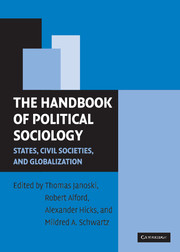Book contents
- Frontmatter
- Contents
- Preface
- Contributors
- Political Sociology in the New Millenium
- PART I THEORIES OF POLITICAL SOCIOLOGY
- PART II CIVIL SOCIETY: THE ROOTS AND PROCESSES OF POLITICAL ACTION
- PART III THE STATE AND ITS MANIFESTATIONS
- 18 State Formation and State Building in Europe
- 19 Transitions to Democracy
- 20 Revolutions and Revolutionary Movements
- 21 Regimes and Contention
- 22 Theories and Practices of Neocorporatism
- 23 Undemocratic Politics in the Twentieth Century and Beyond
- 24 State Bureaucracy
- PART IV STATE POLICY AND INNOVATIONS
- PART V GLOBALIZATION AND POLITICAL SOCIOLOGY
- References
- Name Index
- Subject Index
21 - Regimes and Contention
Published online by Cambridge University Press: 05 June 2012
- Frontmatter
- Contents
- Preface
- Contributors
- Political Sociology in the New Millenium
- PART I THEORIES OF POLITICAL SOCIOLOGY
- PART II CIVIL SOCIETY: THE ROOTS AND PROCESSES OF POLITICAL ACTION
- PART III THE STATE AND ITS MANIFESTATIONS
- 18 State Formation and State Building in Europe
- 19 Transitions to Democracy
- 20 Revolutions and Revolutionary Movements
- 21 Regimes and Contention
- 22 Theories and Practices of Neocorporatism
- 23 Undemocratic Politics in the Twentieth Century and Beyond
- 24 State Bureaucracy
- PART IV STATE POLICY AND INNOVATIONS
- PART V GLOBALIZATION AND POLITICAL SOCIOLOGY
- References
- Name Index
- Subject Index
Summary
How do diverse forms of political contention – revolutions, strikes, wars, social movements, coups d'état, and others – interact with shifts from one kind of regime to another? To what extent, and how, do alterations of contentious politics and transformations of regimes cause each other? Does virulent violence necessarily accompany rapid regime transitions? These questions loom behind current inquiries into democratization, with their debate between theorists who consider agreements among elites to provide necessary and sufficient conditions for democracy and those who insist that democracy only emerges from interactions between ruling-class actions and popular struggle. They arise when political analysts ask whether (or under what conditions) social movements promote democracy and whether stable democracy extinguishes or tames social movements. They appear from another angle in investigations of whether democracies tend to avoid war with each other. At least as context, they loom large in every historical account of popular politics. They figure centrally in any analysis of interactions between democracy and power.
The same sorts of questions recur in studies of industrial conflict, where one school of thought opines that strikes represent breakdowns in bargaining that could be pursued more efficiently by other means, another school of thought argues that strikes entail compromises of labor with capital and thereby integrate workers unwittingly into capitalism, whereas a third view treats strikes as rational, essential means of struggle in competitive capitalism but not elsewhere.
- Type
- Chapter
- Information
- The Handbook of Political SociologyStates, Civil Societies, and Globalization, pp. 423 - 440Publisher: Cambridge University PressPrint publication year: 2003
- 2
- Cited by

